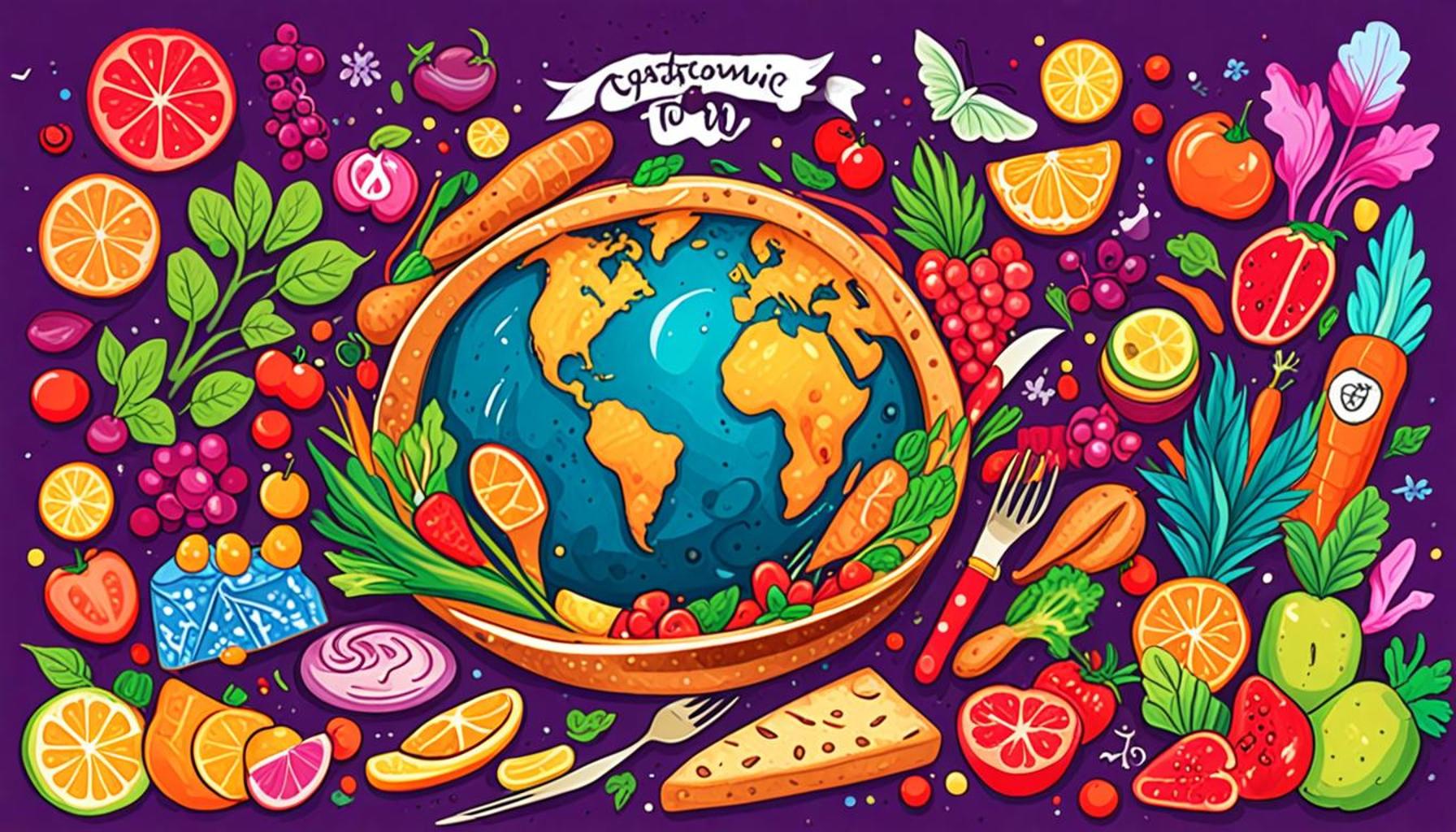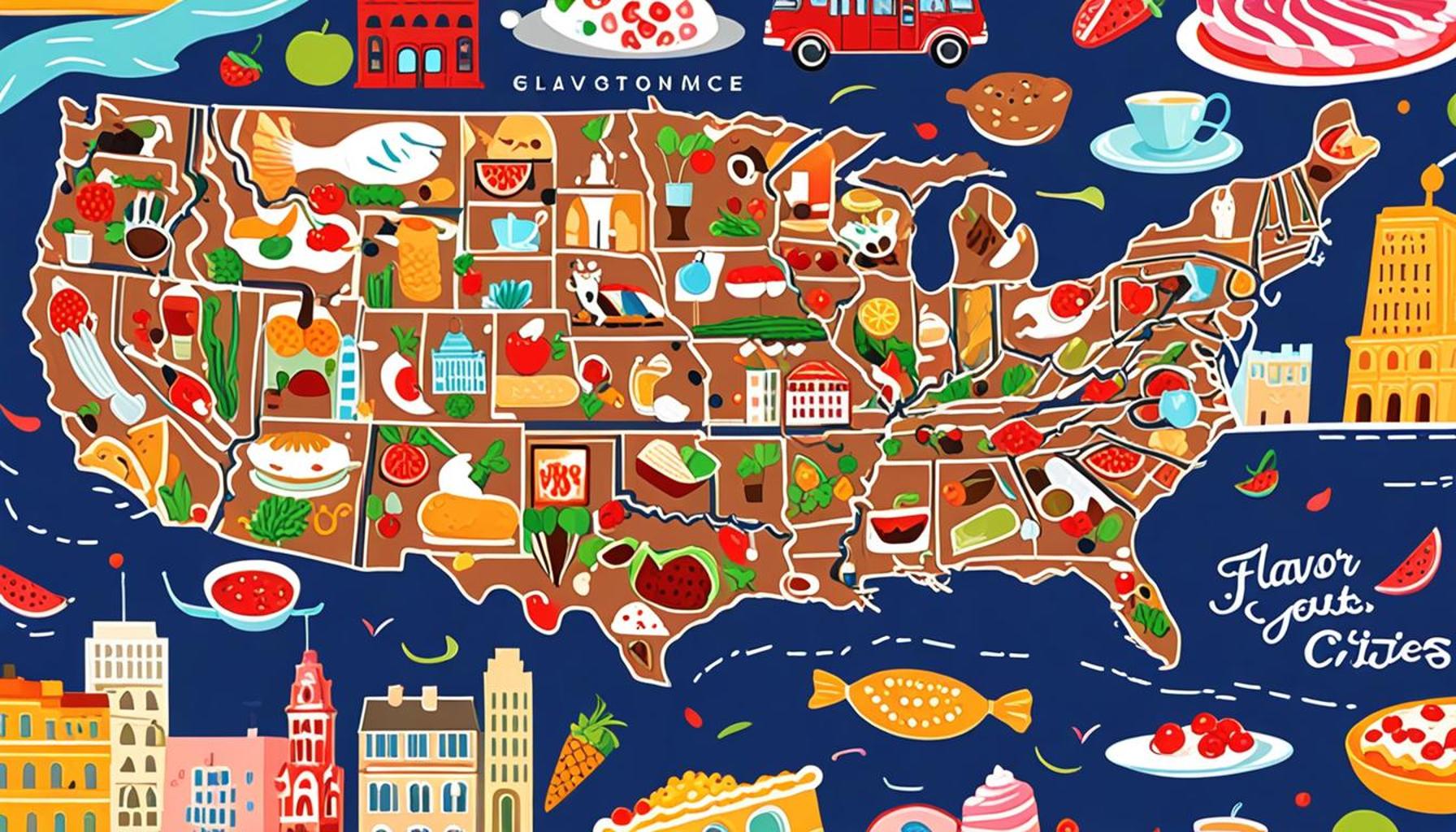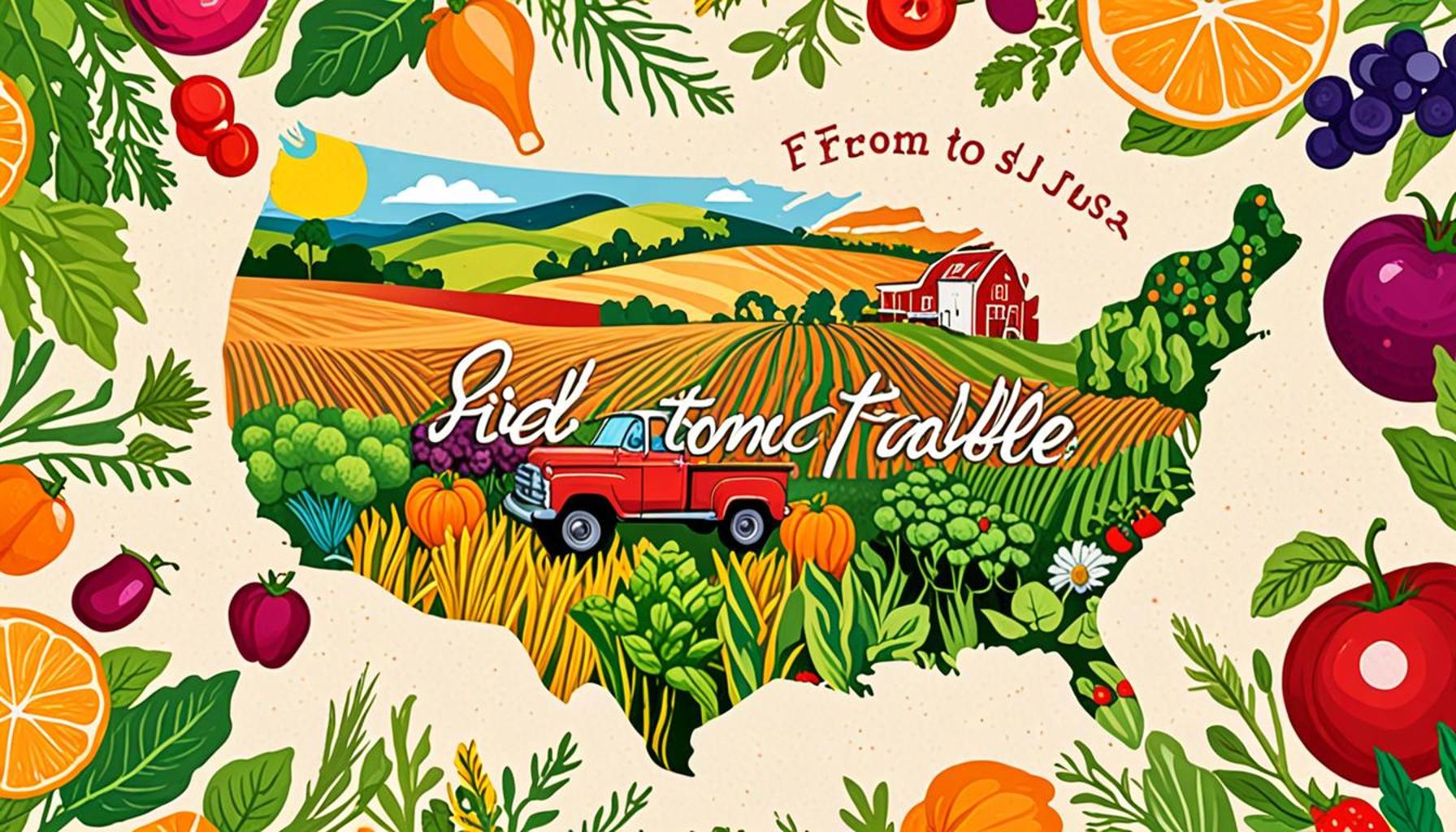Gastronomic Tours and Sustainability: How to Travel with Awareness

Understanding the Impact of Food Choices on Travel
Gastronomic tours have gained momentum among travelers yearning for authentic experiences that immerse them in local cultures. These culinary adventures are not merely about tasting food; they encompass the story of the land, its traditions, and its people. Tourists are increasingly seeking connections to local customs, pulling back the curtain on what defines a region’s identity through its cuisine. However, as the awareness of environmental impacts rises, incorporating sustainability into these explorations becomes essential.
Food Sourcing: A Crucial Element
The concept of food sourcing aims to minimize carbon footprints, which often begin with how ingredients are obtained. Embracing local producers not only supports the regional economy, but also reduces the environmental impact associated with long-distance food transportation. For example, participating in a farm tour in Oregon’s Willamette Valley allows travelers to savor the region’s renowned Pinot Noir directly from vineyards while learning about sustainable farming practices. Such engagement fosters a deeper appreciation for how the wine is produced, from grape to glass, making the experience both enriching and ecologically responsible.
Cultural Respect: Supporting Indigenous Cuisines
Engaging with indigenous cuisines plays a significant role in preserving cultural heritage. Travelers who choose to dine in local eateries, where recipes are passed down through generations, are preserving culinary traditions that may otherwise fade into obscurity. In places like New Mexico, guests can learn about the significance of native ingredients like blue corn and chiles while enjoying traditional dishes crafted with care. This journey not only satisfies the appetite but also respects the cultural narratives surrounding the food.
Waste Reduction: Enhancing the Experience
Waste reduction strategies are more than just an eco-friendly initiative; they improve the overall culinary experience. Tour operators that adopt eco-friendly practices—such as using biodegradable packaging or composting—are paving the way for sustainable tourism. For instance, some tours include cooking classes where participants are taught how to avoid excessive waste, such as utilizing vegetable scraps for stocks or preserving seasonal fruits. Each bite and each lesson helps travelers understand the importance of conscientious eating habits and their role in a healthier planet.
Traveling with an awareness of these elements transforms a simple vacation into a purposeful exploration. By selecting tours that balance gastronomic delight with sustainable practices, tourists not only indulge their taste buds but also contribute to a broader conversation about responsible tourism. Engaging with food from farm-to-table experiences in places like California’s wine country to seafood tours along the bustling coasts invites one to consider the health of the environment and the people who inhabit these regions.

Ultimately, each bite savored on these culinary journeys can lead to greater awareness and heightened appreciation for both the planet and its diverse communities. As travelers, the choice to embark on these thoughtful adventures resonates far beyond personal enjoyment, echoing the impact of conscious culinary tourism in fostering a sustainable future.
DIVE DEEPER: Click here to discover the literary journeys of iconic American authors
Embracing Local Flavors: The Path to Sustainable Gastronomy
A pivotal aspect of gastronomic tours lies in embracing local flavors and culinary practices that speak volumes about a region’s identity. Travelers who immerse themselves in the local palate not only satisfy their cravings but also partake in a journey that promotes sustainability. By exploring the intricacies of local food systems, tourists can foster a deeper understanding of how their choices impact the environment and community.
Supporting Sustainable Practices
When selecting a gastronomic tour, it is vital to look for operators that prioritize sustainable practices at every level. Sustainability can manifest in several ways, including:
- Eco-Friendly Transportation: Choose tours that utilize bike or walking tours to explore culinary hotspots, thereby reducing carbon emissions.
- Farm-to-Table Focus: Support restaurants and tour companies that highlight local, seasonal ingredients, thereby promoting farm-fresh produce and reducing the need for imports.
- Fair Trade Practices: Engage with businesses that ensure fair compensation for local farmers and food producers, fostering economic stability.
For example, in the Pacific Northwest, several eateries source their seafood only from fisheries that adhere to sustainable fishing practices. Tourists who choose these dining experiences contribute to the conservation of vital aquatic ecosystems, all while enjoying a meal that maps the flavor profiles of the region.
Interactive Culinary Experiences
Interactive food experiences, such as cooking classes or farmer’s markets, deepen the connection to the communities visited. These activities provide hands-on opportunities to learn about local ingredients and traditional cooking methods. In places like New Orleans, visitors can roll up their sleeves to prepare classic dishes like gumbo while understanding the cultural significance of each ingredient used.
Such immersive experiences may include:
- Learning about Local Herb Gardens: Discovering how herbs are cultivated and harvested can inspire travelers to appreciate the importance of biodiversity.
- Participating in Farm Tours: Witnessing firsthand how food is grown and harvested encourages transparency in food production and a respect for the environment.
- Community Feast Events: Attending local gatherings enhances social connections and celebrates the culinary heritage of the region.
Facing the Challenge of Food Waste
Food waste is a pressing issue in the culinary world and poses a significant challenge to sustainability. Tourists can make a positive impact by choosing to engage with establishments that actively work to minimize waste. Some innovative restaurants are reshaping their menus based on food availability and surplus, ensuring that less food ends up in landfills. For example, some chefs in New York City have begun utilizing ingredients that are commonly overlooked, such as vegetable peels and stems, thereby enhancing the culinary experience while promoting responsible consumption.
In exploring the nexus of food and sustainability, travelers can find that gastronomic tours offer a remarkable opportunity to contribute to a healthier planet. With careful consideration of food sourcing, culinary education, and minimizing waste, each culinary adventure can pave the way for awareness and positive change, making every meal a step toward a sustainable future.
| Advantages of Gastronomic Tours | Sustainability Focus |
|---|---|
| Enhanced Cultural Insights | Promotes local economies and reduces carbon footprint. |
| Unique Culinary Experiences | Encourages responsible consumption and supports ethical farming. |
As travelers increasingly seek immersive experiences, gastronomic tours offer a gateway to explore authentic cuisine while advocating for sustainability. These tours not only provide enhanced cultural insights into local traditions but also allow tourists to learn directly from chefs and farmers who practice sustainable methods. By engaging with these communities, travelers contribute to local economies, embracing the principle of traveling with awareness.Moreover, the unique culinary experiences that arise from these tours often highlight regional ingredients and cooking techniques that prioritize sustainability. This trend not only satisfies the palate but also fosters a deeper understanding of responsible food sourcing, encouraging responsible consumption among participants. Sustainable gastronomic tours empower travelers to make thoughtful choices, ensuring a positive impact on the environment while enjoying the rich tapestry of global cuisines. As awareness grows, so does the potential for culinary tourism to pave the way for a more conscious approach to travel.
DISCOVER MORE: Click here to find your perfect retreat
Enhancing Cultural Exchange Through Culinary Tourism
Culinary tourism transcends mere dining; it serves as a gateway for cultural exchange and understanding. When travelers participate in gastronomic tours, they encounter more than just food; they explore traditions, histories, and community bonds that enrich their own experiences. This interaction fosters respect and appreciation for different cultures, further emphasizing the importance of sustainable practices in food production and consumption.
Building Relationships with Local Producers
A significant aspect of sustainable gastronomy lies in forging connections with local food producers. Gastronomic tours that include visits to local farms, cheese-makers, or vineyards allow travelers to engage directly with those who cultivate and create their food. This engagement provides deeper insight into the challenges producers face, from climate change to market access, and creates a platform for supporting their sustainability efforts.
For instance, in regions like Napa Valley, some tours include behind-the-scenes looks at local wineries that use organic and biodynamic farming methods. By tasting wines produced through sustainable practices and hearing the stories behind them, visitors gain not only unique flavors but also an understanding of the environmental advocacy that goes into every bottle.
Minimizing Carbon Footprint Through Culinary Choices
The way food is sourced and consumed plays a crucial role in overall sustainability. Tourists can make conscious decisions to minimize their carbon footprint by selecting menus that emphasize plant-based options or that reflect the region’s agricultural heritage. Research indicates that transitioning to a plant-rich diet can be one of the most effective ways for individuals to reduce greenhouse gas emissions.
For example, in cities like Portland, Oregon, numerous restaurants focus on vegetarian or vegan menus. These establishments often highlight ingredients sourced from local farms, and by promoting plant-based dishes, they illustrate how culinary choices can contribute to environmental well-being. By choosing these options, travelers support local economies while also aligning their dining experiences with sustainable principles.
Encouraging Responsible Tourism Practices
As gastronomic tours gain popularity, the responsibility to promote sustainable practices within communities becomes increasingly important. Tour operators can educate travelers about the environmental and social impact of their choices, encouraging them to be mindful of how their actions shape the regions they visit. This could include spreading awareness about over-tourism in culinary hotspots, urging travelers to avoid dining at overcrowded venues that may put additional pressure on local resources.
Moreover, programs like “Dine Around the World” challenge restaurants to pursue zero-waste strategies, incentivizing consumers to visit establishments committed to responsible sourcing and stringent waste management. This empowers travelers to not only enjoy their meals but also to advocate for sustainable practices by patronizing those businesses which prioritize environmental stewardship.
The Future of Gastronomic Tours: A Collective Commitment to Sustainability
As awareness around sustainability grows, so too does the demand for environmentally conscious travel experiences. Gastronomic tours that prioritize sustainability are likely to attract an increasing number of curious travelers eager to connect with local cultures while preserving them for future generations. Moving forward, partnerships between local governments, NGOs, and culinary professionals can drive innovative solutions that harness tourism as a means of sustainable development.
For those planning their next trip, the opportunity to engage in gastronomic tours not only enriches their travel experience but also serves as a catalyst for positive change, encouraging greater consciousness around sustainability in every bite. Ultimately, these culinary journeys can pave the way for a future where tourism is a force for good, balancing enjoyment with responsibility.
DON’T MISS: Click here to discover exciting city tours
Embracing a Sustainable Culinary Journey
In conclusion, gastronomic tours offer a unique opportunity for travelers to engage deeply with local cultures while championing sustainability. Through the lens of food, these experiences not only satisfy the palate but also serve as a platform for education on the significance of responsible sourcing and environmental stewardship. As we explored, building relationships with local producers fosters a connection that enriches both the traveler and the community, allowing for mutual growth and understanding.
Travelers are increasingly recognizing that their culinary choices have a profound impact on the environment. By prioritizing plant-based options and supporting restaurants that strive for sustainability, tourists can effectively reduce their carbon footprint while celebrating regional culinary traditions. The rise of responsible tourism practices encourages each individual to consider the broader implications of their travel habits, pushing for a collective movement towards sustainable tourism.
Looking ahead, the future of gastronomic tours appears promising, fueled by a growing desire for travel that celebrates not only the flavors of a destination but also its ecological integrity. To contribute positively to this evolving landscape, travelers can become advocates for sustainability, using their dining experiences as a means to support local economies and conserve natural resources.
As we savor new culinary landscapes, let us remain mindful of the environments we explore, knowing that every meal has the power to forge connections, celebrate cultures, and promote a sustainable future. Embarking on these gastronomic adventures with awareness transforms not just the dining experience, but also the global community’s approach to tourism itself. Indeed, travel should be as enriching for the earth as it is for the soul.


